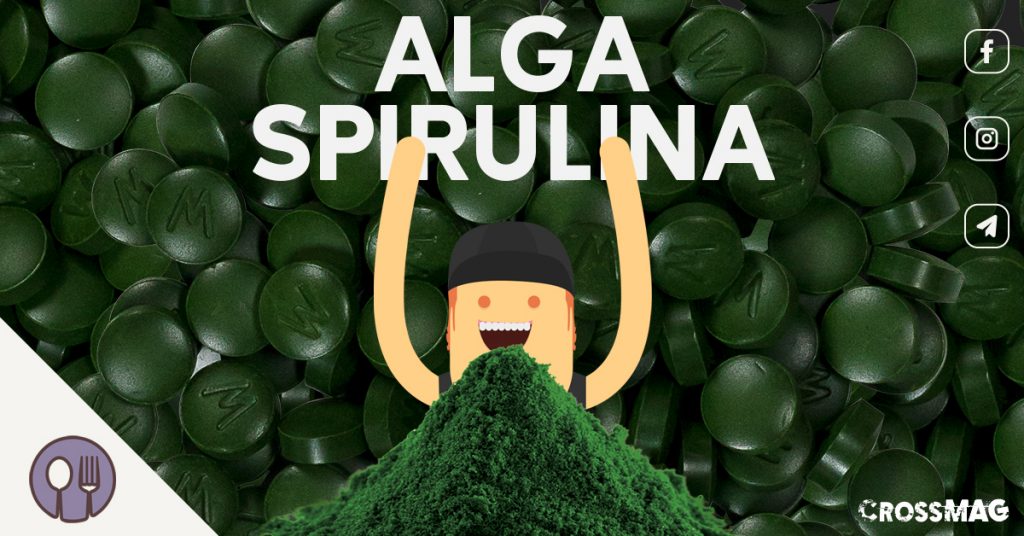Spirulina algae can be considered both a food and a dietary supplement. Blue-green in color, this alga is rich in nutrients and is very effective in preventing or treating some nutritional deficiencies.
Let's see below its properties, its use and what are the main benefits for athletes:
Index
Spirulina algae is rich in ...
Protein
Useful to recovery muscle and tissue support, are protein noble plants that provide our body with all 21 amino acids present in nature.
Lipids
Monounsaturated and dei polyunsaturated (omega-6 and omega-3 and gamma linolenic acid) which are nutrients useful to improve the cholesterol levels in blood, of triglycerides, normalize the blood pressure, participate in the training of myelin sheaths and improve the help the immune system.
Gpolishes
They are immediately assimilable, bringing energy right away.
Vitamins
Vitamin A: some carotenoids (provitamins A, like theastaxanthin) useful for eyesight,
Vitamin B1: useful in the transmission of the nervous impulse
Vitamin B2: fundamental in the energy processes of the body
Vitamin B3: useful for cellular respiration and blood circulation
Vitamin B6: involved in metabolism of amino acids, useful for the formation of white and red blood cells
Vitamin B9: o Aeolian acid essential for the formation of the fetus in pregnancy and useful for fertility
Vitamin K: watch out for people who are on anticoagulants
Vitamin E: excellent vitamin because it is a strong antioxidant
Vitamin D: useful for the fixation of calcium in the bones)
Vitamin C: essential for the proper functioning of the immune system
Mineral salts
Iodine: be careful to consume the seaweed if you have thyroid problems, always consult the endocrinologist who follows the pathology first;
Iron (the iron contained in spirulina is essential for thinning the blood and supporting the heart during the oxygenation of the body); football useful for bones and muscle contraction;
Magnesium essential for muscle relaxation in athletes and to combat fatigue;
Sodium and potassium: useful for regulating blood pressure
Copper
Manganese
Zinc: useful for strengthening the immune system
Selenium: strong antioxidant essential to fight cellular aging.
enzymes: such as SOD (superoxide dismutase) which helps against the fight against free radicals and oxidative stress.
Pigments: phycocyanin which stimulates the production of red blood cells during the oxygenation of the body in a process similar to the action of EPO (Erythropoietin), but in a natural way; carotenoids and chlorophyll, which are antioxidants and anti-inflammatories.
Properties of the spirulina algae
- It balances the tissues because it is alkaline and therefore helps the acid-base balance of the body;
- Contains phenylalanine so pay attention to all those people who cannot ingest this substance;
- Strong antioxidant as it contains vitamins A, E;
- Useful against osteoporosis due to the content of vitamin D which serves to fix calcium in the bones;
- It fights free radicals and is therefore very useful against cellular aging;
- It inhibits the production of inflammatory molecules;
- Lowers triglyceride and bad cholesterol (LDL) levels;
- Useful in case of anemia thanks to the presence of iron;
- Reduces levels of cup sugar in the blood so an excellent ally even in case of high blood sugar;
- Helps detoxify the body from heavy metals;
Spirulina algae and its use in sports
La spirulina it is considered a superfoods which provides many and healthy nutrients and acts as a support in sport ensuring an excellent energy supply.
In sports it is very useful for:
- Improve performance,
- Encourage faster muscle recovery,
- Obtain greater resistance to exertion
- Improve the force muscular
- Fluidify the blood
- Improve blood oxygenation for iron content
The doses to be taken at a sporting level
During competition preparation training: from 2 to 4 grams about 4-8 tablets per day;
During peak sporting periods or races: you have to switch to 4-8 grams per day;
Race day: take 8 grams at least 2-3 hours before
Immediately after physical exertion to help muscle recovery take 5 grams.
Of course it comes to general indications that absolutely do not replace the indications of the treating doctor and the sports doctor which you should always refer to based on your health and training.
Dr. Shuela Curatola
Website: Nutrition
Facebook page: Shuela Curatola
And one last thing we have activated a lot of discounts on Amazon: from 30 to 70% on all sports categories! It's all on our dedicated channel
SUBSCRIBE HERE TO THE TELEGRAM CHANNEL

